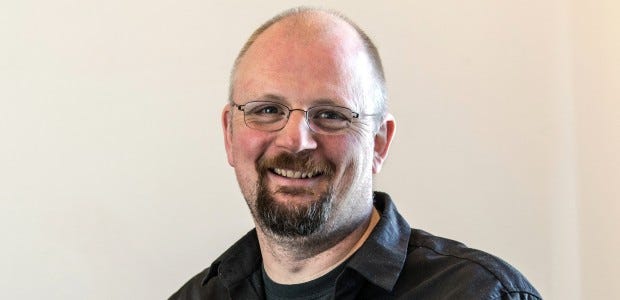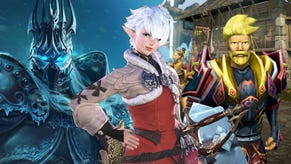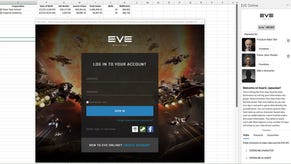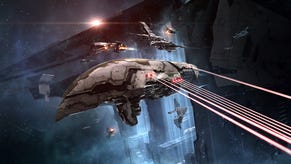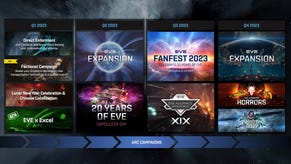Money Talks: An Interview With EVE Online's Economist
Cash Rules EVE-rything Around Me
EVE Online's economy is unique among videogames in being truly player-driven; outside of the wildcard item of PLEX, almost everything in the game is constructed, hoarded and sold by players. The enormous complexity of this is why, seven years ago, CCP decided to hire a full-time economist. “My name is Eyjolfur Eyjo Gudmundsson but no-one can pronounce that,” he laughs, “So I am known as Dr Eyjo. I have a doctorate in economics and in that capacity I am the lead economist for CCP, as well as the head of the analytics unit.” I sat down with Dr Eyjo to talk about EVE's economy, player manipulation, and why everyone isn't leaving the United States.
What exactly does a game economist do? “Observe it, observe it,” says Dr Eyjo. “And if I notice anything that is ongoing in the economy that I think is probably in the wrong direction, I have a meeting with the game designers about possible solutions, about sorting the problems. To give a real world analogy, it is very much like a central bank dealing with governments. Sometimes they agree, sometimes they disagree, but together they have to manage the economy and make it happen.”
“The only exception is PLEX.” In EVE Online players purchase an item called PLEX – Pilot License Extension – which can be exchanged for either 30 days of gametime or sold on the market for hundreds of millions of ISK. “The PLEX is the only item that CCP has stated it is happy to become involved in trading to either stabilise fluctuations or somehow correct the direction the market might be going into, all depending on the circumstances,” says Dr Eyjo. “In the past we have intervened in the market because we've found something broken in the game elsewhere that was impacting the PLEX market which meant that we needed to participate in trading until that is 'fixed' for maybe a period like 7-8 days.”
Observing a nicely-oiled machine is one thing – but EVE's players love a bit of ISK, and the methods they use to obtain it can be outright ingenious. One particularly interesting discussion I had at Fanfest centred around how Goonswarm were manipulating prices for a particular kind of mineral by stockpiling it in specific parts of the universe.
“So when players are able to make a dent in the market by moving prices in a direction of their liking, to me that is a part of PvP,” says Dr Eyjo. “It is player interaction and they are putting a lot of effort into making it happen. It creates excitement and so on within the game, so everything that has to do with player trading – as long as they are using the tools in the way that they are supposed to be used in the game, then I see nothing against players trying to do it. And I challenge them to do it, simply because the size of the EVE eoncomy has become so big now that anyone trying to make a dent in the market overall will have to put a lot of effort into it.”
So something like Burn Jita – where players over the course of a weekend gang up and gank every trader coming into the game's main economic hub – is more or less insignificant?
“I wouldn't say insignificant because it creates a lot of excitement and it certainly affects some prices for the duration of it happening, and sometimes in a direction that stays for a few days or a few weeks,” says Dr Eyjo. “But it's not drastic, and if it was drastic enough that – for example – an item was to completely disappear from the market then we might take a look at that. I just can't foresee that situation. But never say never!”
The fact that such concentrated sabotage has no particular impact makes me curious about the scale of EVE's economy. “There are several ways we look at this,” says Dr Eyjo. “The most reliable measurement is to look at ISK on active accounts – because there are a lot of accounts that are inactive and, as you will know, if you play EVE your stuff is always there even if you quit playing. Even though that ISK exists, we know that it's not going to be used in-game so it doesn't really count even though it could potentially return.”
“So the measurement that we find most valuable to observe is ISK on active paying accounts, people playing the game and subscribed – and that is at any given point between 6 and 700 trillion ISK. A lot of ISK!”
One of those little details that tickles me about EVE Online is that ISK stands for not only Inter-stellar Kredit, but also the Icelandic Krona. Seeing as I mostly interview people about how many guns their game has, and I'm sitting in front of an economist, I decide to ask how things are going for everyone's favourite icy volcano country – after all, they decided not to bail out the banks like the rest of us chumps, but have still ended up in a depression. What gives?
“I think this is slightly misunderstood,” says Dr Eyjo. “What we decided to do was allow our banks to go bankrupt, absolutely, because the country couldn't repay the loans the bank had taken – there was just no way, they were too big. It was not that we were so clever and so anti-capitalist to just say 'no!' We just simply didn't have it. At the same time we decided that anyone that put money into these banks as savings, that was protected. Which is interesting when you think about it because we were protecting the wealth of 5% of the population – and the other 95% of the population was paying for it.”
Dr Eyjo looks very nonplussed and pauses. Am I right in thinking he doesn't agree with this decision? “Yeah. Or, well, what I'm saying is that people look at that decision a little too much on the surface, and should dig down into what actually went on. However our current path is horrible. If we continue on our current path then we will be a natural resource-based economy paying low wages, a country where anyone with application and talent will leave for other countries in 10-15 years. All of them.” Or join CCP? Dr Eyjo laughs.
My reading material on the plane was book-of-the-moment Capital in the Twenty-First Century by Thomas Piketty, which has been making waves due to its argument that our current systems are creating greater and greater inequality in a manner that – without the radical political solutions Piketty suggests, like taxes on capital and an 80% rate on high earners – is irreversible. In short it shows how the rich keep getting richer (and is surprisingly funny). I wonder what Dr Eyjo makes of this, and whether the miniature economy he oversees bears out the book's argument?
“Two things. First I have the book, but haven't read it yet so I can't comment in detail but will take it on faith your summary is accurate. Given what you say, we do see the same behaviour in EVE in the sense that some people, simply put, are able to acquire much more wealth than others. I do though believe that that proportion is more even in EVE than it is in real life, simply because to become that rich in EVE requires you really come up with new schemes and control such a big vast operation that it's very difficult.”
“A lot of the wealth in real-life that is concentrated in few hands is there because of real-life protection,” says Dr Eyjo. “It can be patents that make people very rich, it can be oligarchal restrictions in trade – like in Russia and in some cases the US, where entities have become so big they are difficult to compete with. This is the discussion about companies like Walmart and McDonalds and labour laws and labour costs etc, which shows us that these systems as such might not be good enough to resolve such an issue.”
This is a central part of Piketty's argument also, hence the book's title – the returns on capital exceeding economic growth and, in effect, making it impossible for the system to 'correct' itself towards equality. “A very interesting dilemma that I discovered myself a few years ago in EVE is that, while we were doing balancing – one of our biggest concerns is if a particular function breaks so it starts to give out more wealth relative to others, giving more economic value due to bad code or a mistaken intention, that to us is a problem. If players are able to earn a lot more per hour than other players then that disproportionately destroys the experience for others because they all then rush towards that activity and do it. So we have to think about game balancing in terms of equity so that, whatever you do, you should roughly be able to earn the same.”
“So this made me think: why don't we do the same in real life? As an economist there is this thought that it should all be about the competition,” says Dr Eyjo. “But here we have an example where if we allow one subset of people to earn more money, then they will take all the wealth, people will move towards that activity, and if they cannot do that activity then they will leave.”
“So according to this analogy, why don't people leave the US? After all there is a lot of inequality in the concentration of wealth with a few people, so why don't the rest just leave and go to Canada or the Scandinavian countries? They absolutely can live better lives. It is a perplexing question. So I look forward to reading the book and thinking more about this!”
EVE Online's economy is not, of course, any kind of parallel to the real world economy, and attempting to draw lessons from it always risk falling foul of the fact that we are ultimately talking about internet spaceships. But as I say goodbye to the avuncular Dr Eyjo, I can't help but think of one of CCP CEO Hilmar Petursson's most famous lines. Internet spaceships is serious business.
You can read more of Rich Stanton's EVE Online reporting, including his look at the big game hunters who track and destory EVE's largest ships, his diary of EVE Fanfest 2014 in Iceland, and his investigation of EVE China's biggest battle.
